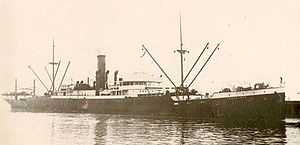SS Corinthic (1924)
 | |
| Career (UK) | |
|---|---|
| Name: | Corinthic |
| Owner: | W.H. Cockerline & Co[1] |
| Port of registry: | Hull[1] |
| Builder: | Irvine's Shipbuilding & Dry Dock Co Ltd,[1] Middleton Shipyard, West Hartlepool |
| Yard number: | 617[2] |
| Completed: | June 1924[1] |
| Out of service: | 13 April 1941[3] |
| Identification: |
code letters KQWB (until 1933)[1] |
| Fate: | Torpedoed and sunk on 13 April 1941[3] |
| General characteristics | |
| Class and type: | cargo steamship[3] |
| Tonnage: | 4,823 GRT[1] tonnage under deck 4,513[1] |
| Length: | 390.1 feet (118.9 m)[1] p/p |
| Beam: | 55.5 feet (16.9 m)[1] |
| Draught: | 24 feet 4 1⁄2 inches (7.43 m)[1] |
| Depth: | 26.2 feet (8.0 m)[1] |
| Installed power: | 442 NHP[1] |
| Propulsion: | triple-expansion steam engine; single screw[1] |
| Crew: | 39 + two DEMS gunners (1941)[3] |
SS Corinthic was a British cargo steamship. She was built on Teesside in 1924, sailed in a number of convoys in the Second World War, survived an overwhelming German attack on Convoy SC-7 October 1940, but was sunk by a German U-boat off West Africa in April 1941.
Early career
Irvine's Shipbuilding and Dry Dock Co Ltd of Middleton Shipyard, West Hartlepool built Corinthic for W.H. Cockerline & Co, who registered her in Hull.[1] She was launched in 1924 and completed in June of that year.[1] The ship had nine corrugated furnaces with a combined grate area of 182 square feet (17 m2) heating three 180 lbf/in2 single-ended boilers with a combined heating surface of 7,551 square feet (702 m2).[1] The boilers fed a three-cylinder triple expansion steam engine[1] built by Richardsons Westgarth & Company of West Hartlepool that was rated at 442 NHP and drove a single screw.[1]
World War II service
In the Second World War Corinthic sailed in convoys for protection against German naval and air attacks. She was part of Convoy SC-7, which sailed from Sydney, Nova Scotia for Liverpool on 5 October 1940. The convoy was overwhelmed by U-boats in a wolfpack attack, losing 20 out of its 35 merchant ships.[5] Corinthic, carrying a cargo of steel and scrap metal, was one of the minority that survived.[6]
Sinking
Early in 1941 Corinthic left the river port of Rosario in northern Argentina with Captain Townson Ridley as her Master and carrying a cargo of 7,710 tons of grain.[3] On 13 April 1941 she was southwest of Freetown in Sierra Leone, West Africa, when German submarine U-124, commanded by Kapitänleutnant Georg-Wilhelm Schulz, hit her with one torpedo at 2229 hours.[3] The damage stopped her but she did not sink, so Schulz fired a second torpedo at 2244 hrs.[3] This was a dud, so at 2254 hrs he fired a third torpedo, after which Corinthic sank and two members of her crew were killed.[3] Captain Ridley, 36 officers and men and two DEMS gunners successfully abandoned ship.[3] The Dutch motor tanker Malvina rescued them and landed them at Freetown.[3]
References
- ↑ 1.0 1.1 1.2 1.3 1.4 1.5 1.6 1.7 1.8 1.9 1.10 1.11 1.12 1.13 1.14 1.15 1.16 1.17 1.18 1.19 Lloyd's Register, Steamers and Motorships (PDF). London: Lloyd's Register. 1931. Retrieved 5 August 2013.
- ↑ Allen, Tony (1 July 2013). "SS Corinthic (+1941)". The Wreck Site. Retrieved 5 August 2013.
- ↑ 3.0 3.1 3.2 3.3 3.4 3.5 3.6 3.7 3.8 3.9 Helgason, Guðmundur (1995–2013). "Corinthic". Ships hit by U-boats. Guðmundur Helgason. Retrieved 5 August 2013.
- ↑ 4.0 4.1 Lloyd's Register, Steamers and Motorships (PDF). London: Lloyd's Register. 1941. Retrieved 5 August 2013.
- ↑ Helgason, Guðmundur (1995–2013). "SC-7". Convoy Battles. Guðmundur Helgason. Retrieved 5 August 2013.
- ↑ Hague, Arnold. "Convoy SC.7". SC Convoy Series. Arnold Hague. Retrieved 5 August 2013.